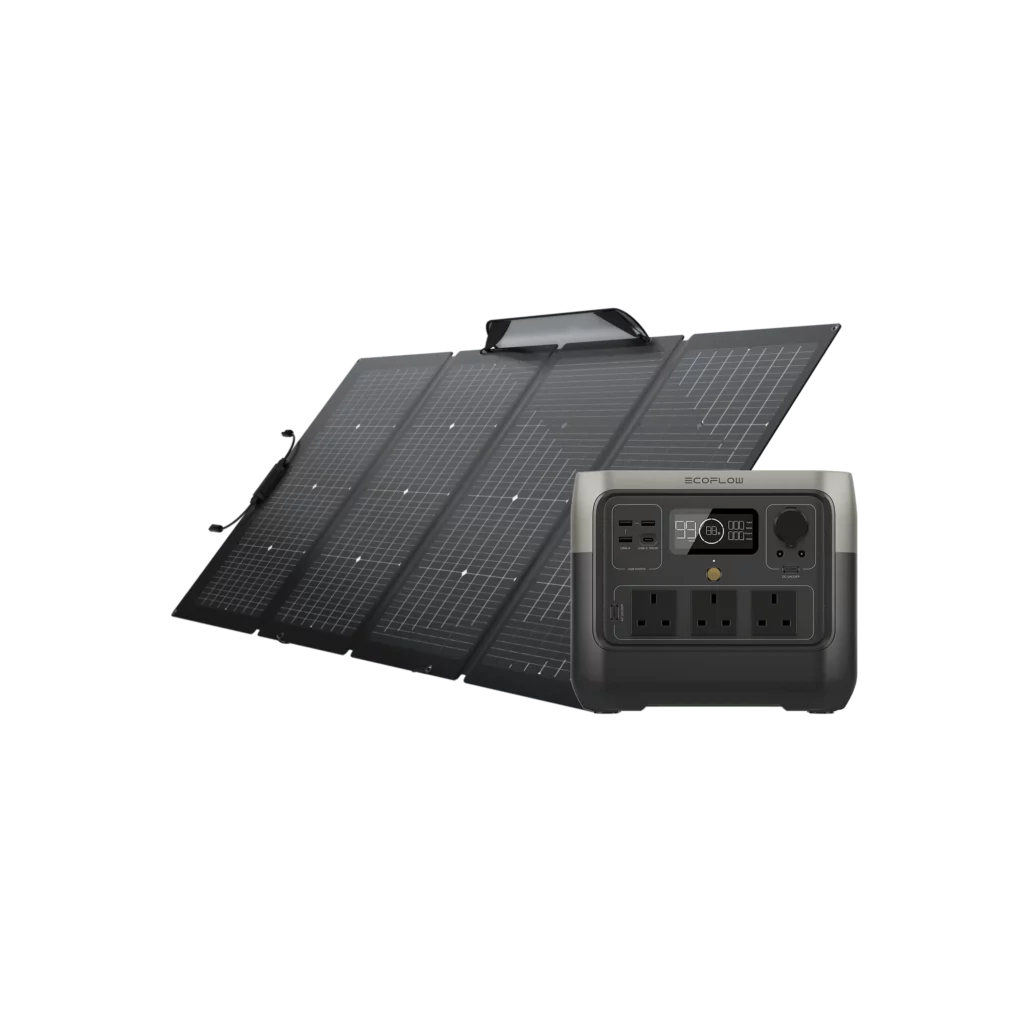Solar chargers are the next generation of solar-powered devices that put renewable energy in your hands. Unlike massive solar generators or rooftop solar panels, solar chargers are compact and easy to transport.
When shopping for one, you need specific information to make an informed purchase. Specs like capacity, outlets, and recharge rates impact any solar charger’s usefulness.
This guide takes you through our recommendations for solar chargers, how they work, and what to look for to find the best one for your energy needs.
If you’re looking for the best portable solar charger, here’s what you need to find it.
Which Portable Solar Charger Is Best?
With all the solar chargers on the market, it can be overwhelming to sort through them all to find the right one. Listed below are some of our top recommendations to get you started.
River 2 Pro + 160W Solar Panel

For its size, the RIVER 2 Pro+ 220W Portable Solar Panel delivers the most energy capacity in a compact build. It gives you access to a personal supply of abundant, renewable power.
With four 200W AC outlets available and a total capacity of 768Wh, the River 2 Pro can charge several devices or appliances simultaneously. It’s enough to power laptops, smartphones, and even your refrigerator. Essentially, it gives you all the power you need for off-grid adventures.
The foldable design of the monocrystalline panels makes them easy to take with you wherever you go while providing sufficient energy to generate electricity quickly. With the River 2 Pro power station weighing only 17.2 lbs (7.8kg) and the solar panel weighing 15.4 lbs (6.98kg), it’s a powerful but compact solar charging setup.
The River 2 Pro also benefits from the patented EcoFlow X-Stream technology, reaching 100% charge in just 70 minutes when plugged into an AC wall outlet. The River 2 Pro is best for off-grid living, where you can keep your generator fully charged without needing to rely on an electrical hookup.
River 2 Max + 160W Solar Panel

The River 2 Max with a 160W solar panel is the best choice if you value portability as much as charging capacity. With 512Wh capacity, it takes high-powered portability to a new level.
The River 2 Max features patented X-Boost technology. It lets you power devices with as much as 1000W capacity so that you can run appliances, power tools, and electronics.
At only 13.4 lbs (6.1 kg), it’s also incredibly lightweight. Throw it in your backpack and take it with you on your adventures to keep your phone, GPS, Bluetooth, and other devices charged.
The 160W monocrystalline panel provides a 21-22% conversion efficiency, making it a reliable way to recharge even on overcast, cloudy days. Your solar panels will pick up enough energy to keep your River 2 Max up and running.
River 2 + 110W Solar Panel

If you’re looking to charge electronics or even small appliances, something like the River 2 + 110W solar panel could be a solid choice. Its 256Wh capacity can charge your smartphone, flashlight, or even some desktops. It’s a compact solar charger to use wherever you are.
The River 2 stands out compared to similar portable chargers on the market, reaching 100% charge in just one hour, sometimes even less. Even if you forget to charge your River 2, it won’t take long to get it back up and running again using solar. Monocrystalline silicon solar panels are the most efficient photovoltaic technology on the market. A protective case that doubles as a kickstand comes included, and an IP67 certification means you can take your solar charger anywhere and have it withstand the elements. This compact package has everything you need to access renewable energy whenever you need it.
Understanding Solar Chargers
Solar chargers use sunlight to generate electricity. Solar panels absorb light (specifically called photons) through photovoltaic cells, and then the charger converts sunlight into electricity that you can use to power devices and appliances.
Solar panels do not work independently but require a portable power station that users plug into to get electricity — the power station converts and stores the energy. When it runs low, you can recharge it using photovoltaic panels or other means like AC outlets or car adaptors.
The best thing about solar chargers is that they supply clean energy from a renewable source. Also, thanks to advancements in photovoltaic technology, they don’t even need exposure to direct sunlight. Even on an overcast day, your PV panels can still generate power using ambient light.
How Do I Choose a Portable Solar Charger?
So, now that you know our recommendations and all about how solar chargers work, it’s time to talk about what you should be looking for to find the best one. Solar chargers all achieve the same fundamental goal, but they may go about it in very different ways. Below is our best advice for what you should look out for before committing to a purchase.
- Look for a Reputable Brand: First, you need to look at the name behind the solar charger. With the growing popularity of renewable, clean energy, numerous manufacturers are jumping on the bandwagon, but that does not mean they have the necessary experience to produce an efficient power station. When assessing whether a brand is legitimate, try to find online reviews from previous customers.
- Know the Difference Between Amperage, Voltage, and Wattage: Amps, voltage, and wattage are three terms you’ll see a lot of when shopping around. It can get confusing, so we will break it down for you in the following bullet points.
- Amperage: a unit of measurement for the amount of electricity running through a circuit. The larger the amperage, the stronger the rate of electricity flow through the circuit.
- Voltage: a unit of measurement for the speed of electricity through a circuit. A power station with a higher voltage can power larger devices such as air-conditioning units. For most purposes, you only need to ensure the voltage is compatible with your systems. Most voltages, such as for motorhomes, will be either 12v for DC or 120V for AC.
- Wattage: a unit of measurement for the amount of power an electrical device will consume. It varies enormously, as illuminating a lightbulb will generally only require 40-75 watts, whereas running a vacuum could require up to 900 watts. You’ll need to know the wattage of the solar charger’s battery capacity and your energy consumption (more on that next).
- Ensure You Choose the Right Wattage: You need to know the wattage of the devices or appliances you want to power before committing to a purchase. Otherwise, you could buy a power station that isn’t up to the task. Remember, the higher the wattage, the more power your solar charger can provide.
- Consider the Portability: If you plan to take your solar charger camping with you or on similar outdoor excursions often, you need to make sure it’s portable enough for the task. It’s not just the power station but also the solar panels that impact portability. Foldable solar panels are perfect for this purpose.
- Ports: Finally, you need to read the specifications to identify how many ports the solar charger provides, as this will directly translate to how many devices and what types you can charge. If you know that you will want to charge multiple devices or appliances at any time, you need to ensure your solar charger can do that.
What Makes a Good Solar Charger?
The short answer to this question is a good solar charger is the one that meets your particular needs. The River 2 would be perfect for a solo explorer, but a larger group would benefit more from the River 2 Pro with the 220W solar panel.
A good solar charger should meet the following criteria:
- Durable design
- Foldable PV panels for portability
- Sufficient wattage and power capacity
- Highly efficient photovoltaic cells
These benchmarks are the critical ones to hit. Once they are out of the way, it’s pretty much down to you and your individual needs—just do your research before finalising a purchase!
Why Choose a Solar Generator Over Other Options?
There are numerous advantages to solar generators that other options don’t possess. First, solar power is a clean, renewable energy source. It produces no harmful fumes or pollutants and is in endless supply.
Solar generators are also more reliable than other solar chargers, such as small battery banks. While a battery bank could charge a smartphone maybe once or twice at most, solar generators give you higher capacity and charge more than just a phone. They can charge your smartphone ten or twenty times over!
Is a Portable Solar Charger Right for You?
If you’re reading this article, the answer is probably yes! We’re confident that you will feel the same way. Portable solar chargers are energy efficient, easy to use, and provide energy independence whether you use them at home or while travelling.
If you agree that a solar charger is the right choice, EcoFlow can be a great resource. Browse the collection today and see why solar generators are the future.







